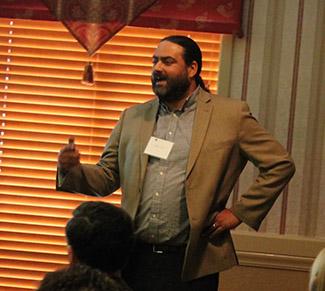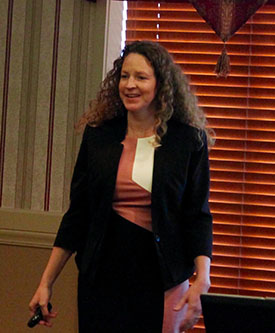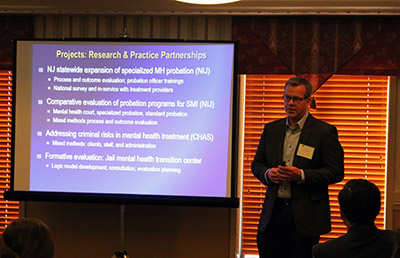Criminal Justice: The Challenge of Translational Research

Dean Jim Clark and Dr. Stephen Tripodi of the Florida State University (FSU) College of Social Work hosted a multidisciplinary conference aimed at showcasing research efforts in the area of mass incarceration and discussing the translational opportunities and challenges of research-practice collaborations in the criminal justice system. Drs. Carrie Pettus-Davis(Washington University in St. Louis), Matt Epperson (University of Chicago), and Stephen Tripodi presented their research on the correlates, consequences, and costs of mass incarceration with an emphasis on specific areas for future transdisciplinary collaboration. The presenters made several specific calls to action for researchers and criminal justice professionals to enhance the lives of those involved in the criminal justice system and to meet the grand challenge of Smart Decarceration; one of the 12 Social Work Grand Challenges for Social Work according to the American Academy of Social Work & Social Welfare (AASWSW). Smart Decarceration is characterized by a comprehensive and proactive effort to reduce the use of excessively punitive policies against offenders leading to mass incarceration, to support rehabilitation and reentry to the community, and to enhance the quality of life for those affected by incarceration.

The two-part event, “Criminal Justice: The Challenge of Translational Research” brought leading social work researchers who study criminal justice related issues from across the country to discuss their current research and point to future applications to ameliorate negative effects associated with mass incarceration, namely serious mental illness, previous victimization and trauma, barriers to successful reentry, and strategies to end the era of mass incarceration successfully. The first portion of the event included four related presentations by research faculty. Dr. Pettus-Davis, Founding Director of the Concordance Institute for Advancing Social Justice at Washington University’s Brown School of Social Work, highlighted that the causes of mass incarceration are multifaceted—rooted in social, political, and economic events. As a result, she continued, our efforts to enhance Smart Decarceration must be similarly multifaceted. Simply ejecting an individual into a community without the necessary ecological supports greatly reduces successful re-entry and further exacerbates the negative repercussions associated with incarceration, further increasing the risk of re-offense, re-arrest, and re-incarceration.
Dr. Tripodi’s presentation included discussion of two separate, yet related research projects regarding the effects of childhood physical and sexual abuse on mental health and substance use outcomes for incarcerated women. He concluded by noting that future work must seek to include larger, more representative samples so as to examine the relationships among additional covariates, improve intervention fidelity, and enhance strategies for accurate measurement. All of this, he added, requires supportive relationships with criminal justice stakeholders.

Dr. Epperson also noted that efforts to dismantle criminal justice cycle involvement is predicated on partnerships with criminal justice practitioners and administrators. In their final joint presentation, Drs. Pettus-Davis and Epperson concluded that establishing and maintaining relationships with public, private, and academic partners is essential to informing innovative policies, and thereby shaping real-world programs and front-line practices necessary to change lives.
The second portion of the event included an expert panel. Expert panelists included Dr. Jennifer Copp (FSU College of Criminology), Dr. Eyitayo Onifade (FSU College of Social Work), Dean Jim Clark (FSU College of Social Work), and Abe Uccello (Florida Department of Corrections). Recommendations for increasing the application of evidence-driven interventions to real-world problems included to increase transdisciplinary collaboration and practitioner partnerships, to revise language that is both concrete and strengths-based, and to embrace creativity in knowledge development.
Dr. Pettus-Davis noted that transdisciplinary collaboration requires that research teams embrace unique disciplinary strengths across fields to solve complex human problems. Dr. Copp noted that a focus on both unique and shared experiences of those involved in the criminal justice system is critical to researchers’ efforts to understand the correlates and consequences of crime and victimization, and queried as to what role criminological researchers could play in AASWSW’s Smart Decarceration challenge. Mr. Uccello added that both researchers and practitioners must acknowledge that they cannot do this alone and that the community must stand as “bookends” to the research feedback loop and continuum of criminal justice service. The use of evidence-driven interventions, alongside soliciting practitioner and client perspectives, are essential to success. With audience feedback, Mr. Uccello and Dr. Tripodi concluded that future researchers, practitioners, and educators must clearly define terms like “recidivism” or “re-offense.” Changing the narrative in our communities, classrooms, and collaborations supports the construction of a paradigm shift regarding how we think about, and ultimately engage with, individuals who are or were incarcerated. This shift is critical to providing those affected by the criminal justice system the resources necessary to remain successful.
Dr. Pettus-Davis, in reply to Dr. Copp’s query, noted that criminological researchers are distinctively situated to further refine the theories and models core to our understanding of crime and victimization. Social work researchers, she added, have historical roots in seeking to end social disparities and injustice, understand the ecological frameworks necessary to effect systemic change, and are gifted in the application and investigation of interventions and are central to these efforts, as well. Dean Clark further noted that approaching such problems requires us to abandon the “old ways” of research and to embrace creative projects, designs, and analytic strategies to make a difference in the lives of those affected by the criminal justice system. With these and other calls to action, the FSU College of Social Work will continue to support the initiative in both research and practice. The College has and continues to conduct cutting-edge research in an effort to break the cycle of mass incarceration. Further, with Dr. Tripodi’s new role as a Co-Leader for the Education Working Group of the Smart Decarceration Initiative, he and the College of Social Work stand at the precipice of a new era of practice—uniquely equipped to support the growth of highly-trained professional helpers in the effort to promote Smart Decarceration and enhance the lives of those affected by the criminal justice system.

